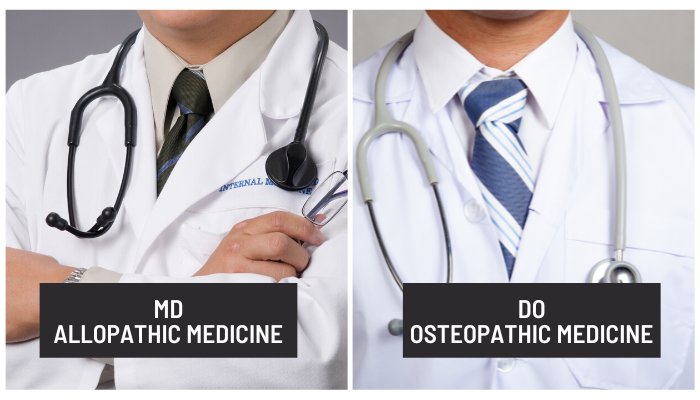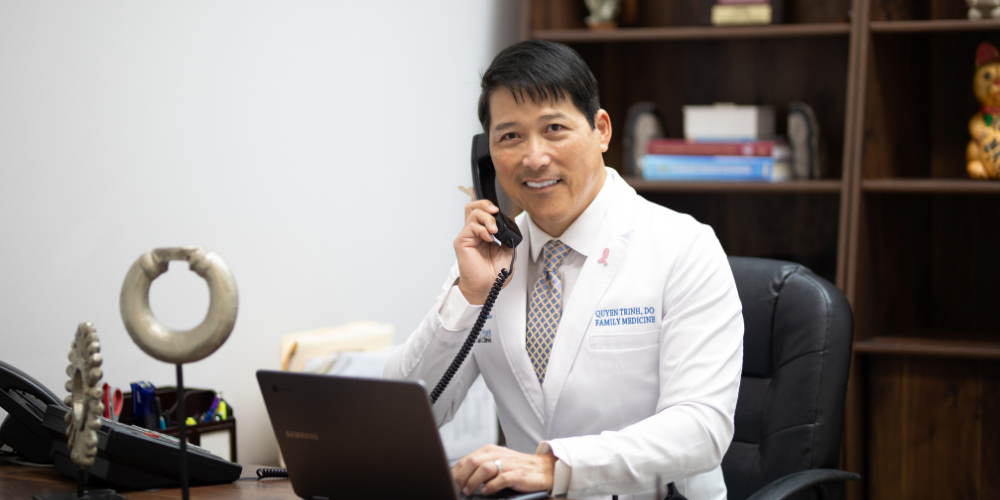Have you ever wondered what the abbreviations after a doctor’s name means? In the United States, physicians can get a medical degree to become a doctor of medicine (MD) or a doctor of osteopathic medicine (DO).
Understanding the similarities and differences between an MD and a DO can assist you in choosing the right doctor to meet your needs. It can also help you make informed health care decisions for yourself and your family.
What is a DO vs. MD?
DO is a designation for a “doctor of osteopathic medicine,” and MD is the designation for a “doctor of medicine.”
DOs and MDs are similar as both went to medical school. They received extensive medical training, passed examinations and boards, and are qualified to practice medicine, prescribe medication, and perform surgery.
Although DOs and MDs are both licensed physicians, they each hold a different type of medical degree.
Allopathic vs. Osteopathic Medicine

Allopathic Medical Degree
Allopathic medicine is the more traditional approach to health care. It focuses on treating illnesses with medication or surgery to help alleviate the symptoms of diseases. MDs receive their degrees from allopathic medical schools accredited through the Liaison Committee on Medical Education (LCME).
Osteopathic Medical Degree
Osteopathic medicine is a holistic, patient-centered approach to health care. This approach focuses on treating the patient and the root cause of the illnesses rather than the symptoms. DOs also strongly believe in preventive care to advert chronic conditions from developing. DOs receive their degrees from accredited osteopathic medical schools.
What is the Difference Between MD and DO?
A few significant differences between an MD (doctor of medicine) and a DO (doctor of osteopathic medicine) are highlighted below.
- Symptomatic vs. Holistic Approach to Medical Care
MDs focus on diagnosing and treating specific illnesses or symptoms of the conditions. In contrast, DOs take a more holistic approach to health care. They recognize that many conditions patients suffer from may come from other areas of their bodies, lifestyles, or diets.
For example, a patient who visits an MD for migraines will receive medicine and might undergo some tests to determine what medical conditions are causing the migraines. However, a patient who visits a DO for migraines might receive similar care. In addition, the DO will also examine everything about the patient, including the rest of the body, the patient’s environment, diet, and overall lifestyle. DOs recognize that medical issues often result from other risk factors.
DOs believe in the power of medicine, testing, and other parts of traditional medicine. They have no issues using them if it will help their patients. However, DOs believe that conventional medicine does not have all the answers. They recognize that a patient’s experience and situation impact their physical and mental condition, which strongly affects overall health. A DO seeks to examine all of these factors when diagnosing and treating a patient.
This holistic approach allows DOs to ask questions and examine a patient from a different perspective than an MD. DOs take extra time to explore the entire body to find the root cause of the ailment or illness before recommending a treatment plan.
- Additional Medical Training for DOs
DOs must complete an additional 200 hours of medical training on the musculoskeletal system, the body’s interconnected system of nerves, muscles, and bones. MDs do not receive this extra training.
DOs recognize that many ailments, including migraines, asthma, and muscle pain, can be helped by applying gentle pressure, resistance, and stretching to our musculoskeletal system.
They can use OMT (osteopathic manipulative treatment) to provide pain relief, help promote healing and increase overall mobility. In some cases, OMT can be used to complement or even replace drugs or surgery.
- Doctor-Patient Relationships Are Vital to DOs
Unlike MDs who take a more traditional symptomatic approach to health care, DOs strongly believe in cultivating a patient-focused approach to medical care. Physicians trained as osteopaths typically strive to build strong doctor-patient relationships. They know these relationships are essential in helping them customize treatment plans to provide the best care for their patients.
Get Help from an Osteopathic Doctor in Katy, TX

As a DO, Dr. Quyen Trinh uses his holistic approach to help his patients stay healthy and maintain a good quality of life. Dr. Trinh is a big advocate of building solid doctor-patient relationships. He is fully committed to providing each patient with the highest quality care. His patients share their success stories.
If you’re ready to experience the DO difference, please call (281) 646-0740 to schedule an appointment. Or, if you prefer, you can use our online scheduler to book an appointment with Dr. Trinh or one of our other highly-skilled medical practitioners. We look forward to helping you.




